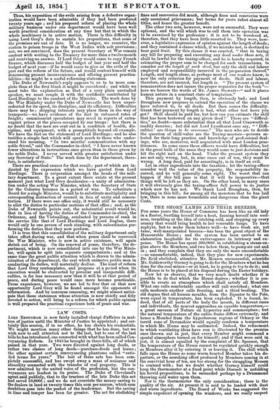LAW COSTS.
Loan BROUGRAM is now fairly installed charge d'affaires in mat- ters of justice until the Minister of Justice be appointed ; and cer- tainly this session, if in no other, he has shown his credentials. We might mention many other things that he has done but we wish now to call attention not to the last, but to one of the last bills he has introduced, one connected with what has been called Con- veyancing Reform. In 1845 he brought in three bills, all of which passed in that year. Two were directed against long deeds, or rather two classes of long deeds--purchase-deeds and leases ; the other against certain conveyancing phantoms called "satis- fied terms nor years." The last of these acts has been com- pletely successful, and has swept away a mass of nuisance and absurdity connected with the transfer of real property. This is now admitted by the united voice of the profession, but the con- veyancers are loudest in its praise. The Duke of Cleveland's agent said publicly, that to the trustees of the late Duke this act had saved 100001.; and we do not overstate the money-saving to the dealers in land at twenty times this sum per annum, which sum doubtless goes into the pocket of the landowner. But the saving in time and temper has been far greater. The act for abolishing
fines and recoveries did much, although fines and recoveries were only occasional grievances • but terms for years infest almost all titles and hence the greater benefit.
The other two acts, however, were not so successful. They were optional, and the will which was to call them into operation was to be exercised by the profession : it is not to be wondered at, therefore, that they have been little resorted to. They were, how- ever, a legislative expression of opinion against the length of deeds ; and they contained a clause which, if we mistake not, is destined to bear good fruit. By this clause it was enacted, "that in taxing any bill for preparing and executing any deed under these acts, it shall be lawful for the taxing-officer, and he is hereby required, in estimating the proper sum to be charged for such transactions, to consider not the length of such deed, but only the skill and labour employed and responsibility incurred in the preparation thereof." Length, and length alone, as perhaps most of our readers know, is now the only criterion for payment of deeds. Skill and labour, therefore, are not insured, but length is. " The present system of remuneration does not insure the proper requisites for the work "— here we borrow the words of Mr. James Stewart—" and it places human nature in a constant state of temptation." This payment by length, then, is obviously bad ; and Lord Brougham now proposes to extend the operation of the clause we have referred to, to all deeds. But then comes the difficulty. Grant that payment by length is bad, what other test have you got ? Skill should be paid for, but how can you estimate the skill that has been bestowed on any given deed ? There are "difficul- ties," no doubt—more substantial than all that Lord Cranworth so readily descries ; but did not Lord Lyndhurst once say, " ' Diffi- culties ' are things to be overcome." The men who are to decide the question of skill-value are the Taxing-masters—persons se- lected for their long practice and knowledge of professional deal- ings, who are, moreover, well acquainted with most London prac- titioners. In some cases these officers would have difficulties, but in the great bulk of the cases they would come to just decisions and hit the right nail on the head. Under the present system they are not only wrong, but, in nine eases out of ten, they must be wrong. A long deed, paid for accordingly, is in itself an evil. Let in other ingredients into the taxation ; let the taxing-officer consider well the value of the property, the responsibility in- curred, and he will generally come right. The worst that can happen if this bill pass is that it will be inoperative—that things will be left as they are. On the other hand, in many cases it will obviously give the taxing-officer full power to do justice which now he has not. We thank Lord Brougham, then, for bringing in this bill; for among all the monsters that he has laid low, there is none more formidable and dangerous than the giant Costs.


























 Previous page
Previous page